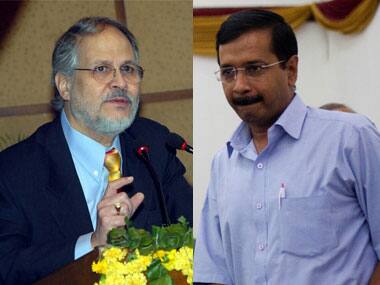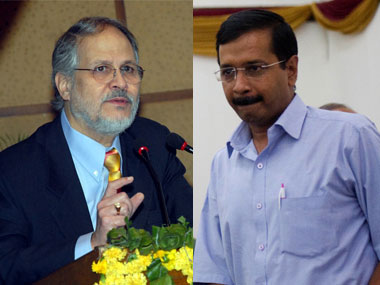New Delhi: The Aam Aadmi Party-led Delhi government has escalated its conflict with Lieutenant Governor Najeeb Jung over the appointments of bureaucrats into a full-blown war in what appears to be a demand for full statehood to the national capital. However, the swelling support from Opposition parties such as the Congress and the Left, is perhaps only aimed at cornering the Narendra Modi-led government in the Centre, ahead of its one year anniversary, say political experts. [caption id=“attachment_2254840” align=“alignleft” width=“380”]
 Delhi LG Najeeb Jung and Chief Minister Arvind Kejriwal.[/caption] The Modi government, they argue, has a reason to worry as the growing support for Kejriwal may well create a serious problem for the Centre if they fail to handle the stalemate strategically. Speaking to reporters on Wednesday, Delhi Congress chief Ajay Maken said that a chief secretary “should be appointed as per the wishes of the chief minister”, a view echoed by CPI(M) chief Sitaram Yechury who argued that the Centre should not to encroach upon the rights of states in such matters. Interestingly, ousted AAP leaders also extended support to the dispensation here saying the “choice of a democratically elected government should be respected”. Abhay Kumar Dubey, senior fellow at the Centre for the Study of Developing Societies (CSDS), says the ongoing conflict has once again brought into focus the demand for full statehood to Delhi so that a clear demarcation of powers of the Centre as well as the state can take place. “It is ironical that an elected chief minister is not taken into confidence in the appointments of bureaucrats with whom he has to work with. And therefore, the AAP government wants to use the ongoing tussle to launch a full-fledged struggle to take forward long-standing demand of full statehood to the national capital where a chief minister can have his control,” he told Firstpost. Dubey suggests that Opposition parties at the Centre are trying to exploit this opportunity to corner the Modi government. “The issue has given the Opposition a golden opportunity to attack the government at the Centre,” he said cautioning the government that “if the stalemate is not handled strategically, it can result into a serious problem for the Centre-state relations”. On Tuesday, both, Lt Governor Jung and Chief Minister Kejriwal met President Pranab Mukherjee to discuss the ongoing controversy, where they both reportedly accused the other of violating constitutional norms. “Now, the ball is in the court of the President. If the Centre agrees to resolve the issue amicably, the confrontation may end. But if it recommends to the President that he should take over and dissolve the Delhi Assembly (by exercising power under Article 356(1)), it will have to pay heavy price for the blunder because the government in Delhi has come to power with an overwhelming majority,” Dubey says. Other political analysts, too, agree with the argument that Kejriwal is using the controversy to highlight how important the demand for full statehood is, but they disagree that the controversy will result in the imposition of President’s Rule. “If a chief minister is not even empowered enough to appoint secretaries and chief secretary of his choice, then there is no meaning of democracy. The Centre will have to understand that if Delhi is not a full-fledged state, it is also not a Union Territory like Chandigarh, which houses assemblies of two states, but is governed by the Centre. Delhi has its Assembly and democratically elected chief minister. He should be allowed to function independently. What is the point of having a chief minister when he has no control over many important departments? Kejriwal wants to raise the question loud and strong to prepare ground for a new mass movement to press the Centre to give Delhi the status of a full-fledged state,” said Om Thanvi, a veteran political commentator told Firstpost. Ruling out any possibility of the dissolution of the Delhi Assembly, he said, “It is something which the government cannot afford.” However, Varghese K George, political editor, The Hindu, dismisses the Opposition parties’ solidarity with AAP, suggesting that their coming together is aimed at launching a concentrated attack on the BJP government. “Instead of making an effort to settle the issues by bringing clarity in the demarcation of power, the Lt. Governor is locking horns with the political leadership. At the same time, levelling allegations against civil servants is unbecoming of a chief minister. The fight has become nasty and ugly and it is bringing disrepute to both the offices of the chief minister and the Lt Governor,” he told Firstpost. He added that the “Opposition parties are joining hands with AAP on this issue just because they have a chance to launch an attack on the Centre”. Swaraj Samvad, the new political organisation by former AAP leaders Prashant Bhushan and Yogendra Yadav, termed the fight as unfortunate. “The politics of personal allegations, brinkmanship and dragging of the bureaucracy into petty political fights is unfortunate,” a statement issued by the organisation said. But the ongoing political tussle has already had an impact on the bureaucracy. The allegations and counter allegations could well back fire on AAP’s political prospects as it is bringing down the morale of the bureaucrats in the Delhi government. Caught in the cross fires between the two constitutional authorities, the officers say anyone of them can fall victim to the clash of egos. Many officials have either applied for leave or transfers from the Delhi government because they say the AAP government has made the work environment unpleasing. They say the allegations against Power Secretary Shakuntala Gamlin, whose appointment as the acting chief secretary created an unnecessary uproar, has demoralised them and therefore, they are seeking deputation in the Central government. And if they are not provided a cordial atmosphere, it will adversely impact the government’s performance.
Delhi LG Najeeb Jung and Chief Minister Arvind Kejriwal.[/caption] The Modi government, they argue, has a reason to worry as the growing support for Kejriwal may well create a serious problem for the Centre if they fail to handle the stalemate strategically. Speaking to reporters on Wednesday, Delhi Congress chief Ajay Maken said that a chief secretary “should be appointed as per the wishes of the chief minister”, a view echoed by CPI(M) chief Sitaram Yechury who argued that the Centre should not to encroach upon the rights of states in such matters. Interestingly, ousted AAP leaders also extended support to the dispensation here saying the “choice of a democratically elected government should be respected”. Abhay Kumar Dubey, senior fellow at the Centre for the Study of Developing Societies (CSDS), says the ongoing conflict has once again brought into focus the demand for full statehood to Delhi so that a clear demarcation of powers of the Centre as well as the state can take place. “It is ironical that an elected chief minister is not taken into confidence in the appointments of bureaucrats with whom he has to work with. And therefore, the AAP government wants to use the ongoing tussle to launch a full-fledged struggle to take forward long-standing demand of full statehood to the national capital where a chief minister can have his control,” he told Firstpost. Dubey suggests that Opposition parties at the Centre are trying to exploit this opportunity to corner the Modi government. “The issue has given the Opposition a golden opportunity to attack the government at the Centre,” he said cautioning the government that “if the stalemate is not handled strategically, it can result into a serious problem for the Centre-state relations”. On Tuesday, both, Lt Governor Jung and Chief Minister Kejriwal met President Pranab Mukherjee to discuss the ongoing controversy, where they both reportedly accused the other of violating constitutional norms. “Now, the ball is in the court of the President. If the Centre agrees to resolve the issue amicably, the confrontation may end. But if it recommends to the President that he should take over and dissolve the Delhi Assembly (by exercising power under Article 356(1)), it will have to pay heavy price for the blunder because the government in Delhi has come to power with an overwhelming majority,” Dubey says. Other political analysts, too, agree with the argument that Kejriwal is using the controversy to highlight how important the demand for full statehood is, but they disagree that the controversy will result in the imposition of President’s Rule. “If a chief minister is not even empowered enough to appoint secretaries and chief secretary of his choice, then there is no meaning of democracy. The Centre will have to understand that if Delhi is not a full-fledged state, it is also not a Union Territory like Chandigarh, which houses assemblies of two states, but is governed by the Centre. Delhi has its Assembly and democratically elected chief minister. He should be allowed to function independently. What is the point of having a chief minister when he has no control over many important departments? Kejriwal wants to raise the question loud and strong to prepare ground for a new mass movement to press the Centre to give Delhi the status of a full-fledged state,” said Om Thanvi, a veteran political commentator told Firstpost. Ruling out any possibility of the dissolution of the Delhi Assembly, he said, “It is something which the government cannot afford.” However, Varghese K George, political editor, The Hindu, dismisses the Opposition parties’ solidarity with AAP, suggesting that their coming together is aimed at launching a concentrated attack on the BJP government. “Instead of making an effort to settle the issues by bringing clarity in the demarcation of power, the Lt. Governor is locking horns with the political leadership. At the same time, levelling allegations against civil servants is unbecoming of a chief minister. The fight has become nasty and ugly and it is bringing disrepute to both the offices of the chief minister and the Lt Governor,” he told Firstpost. He added that the “Opposition parties are joining hands with AAP on this issue just because they have a chance to launch an attack on the Centre”. Swaraj Samvad, the new political organisation by former AAP leaders Prashant Bhushan and Yogendra Yadav, termed the fight as unfortunate. “The politics of personal allegations, brinkmanship and dragging of the bureaucracy into petty political fights is unfortunate,” a statement issued by the organisation said. But the ongoing political tussle has already had an impact on the bureaucracy. The allegations and counter allegations could well back fire on AAP’s political prospects as it is bringing down the morale of the bureaucrats in the Delhi government. Caught in the cross fires between the two constitutional authorities, the officers say anyone of them can fall victim to the clash of egos. Many officials have either applied for leave or transfers from the Delhi government because they say the AAP government has made the work environment unpleasing. They say the allegations against Power Secretary Shakuntala Gamlin, whose appointment as the acting chief secretary created an unnecessary uproar, has demoralised them and therefore, they are seeking deputation in the Central government. And if they are not provided a cordial atmosphere, it will adversely impact the government’s performance.
Decoding the battle with LG Najeeb Jung: Why Arvind Kejriwal is digging in
Tarique Anwar
• May 21, 2015, 07:12:32 IST
The Aam Aadmi Party-led Delhi government has escalated its conflict with Lieutenant Governor Najeeb Jung over the appointments of bureaucrats into a full-blown war in what appears to be a demand for full statehood to the national capital.
Advertisement
)
End of Article